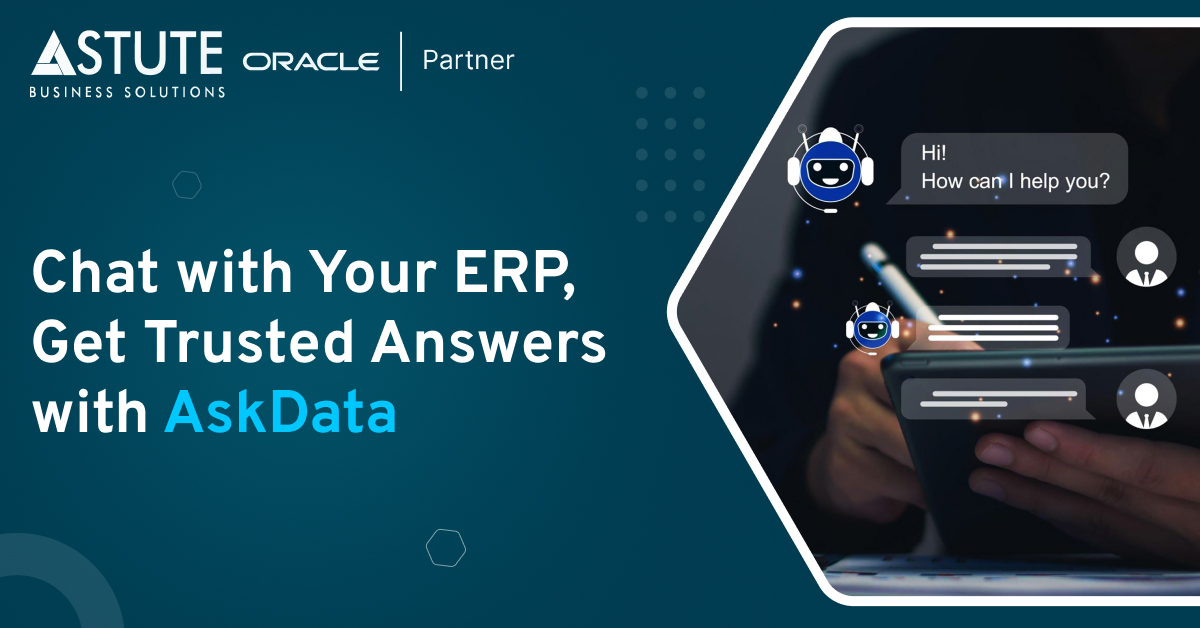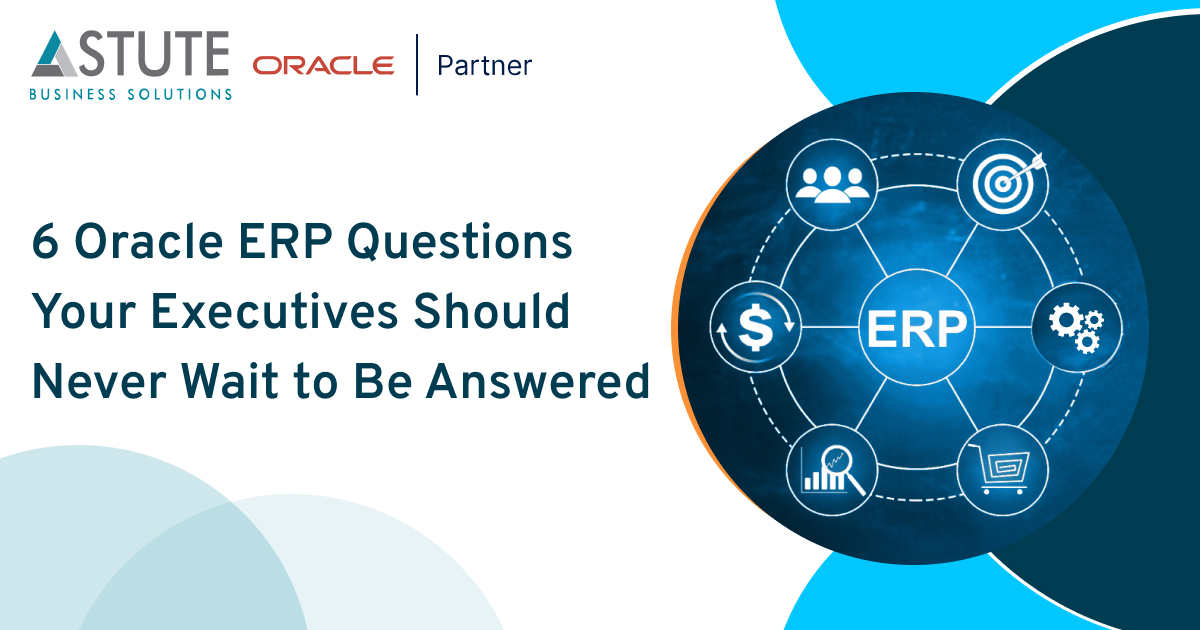Ask, Analyze, Act: How AskData Puts ERP Answers at Your Fingertips
-1.jpg)
Table of Contents
What’s the point of having all your enterprise data if you can’t get answers when it matters most?
That’s the frustration many finance, procurement, and operations leaders face daily. They know the data exists, inside Oracle PeopleSoft, EBS, or JD Edwards, but pulling it out requires navigating outdated interfaces, waiting on overworked BI teams, or wrangling with SQL reports. By the time the insight arrives, the moment to act has passed.
That’s where AskData comes in. Purpose-built for Oracle ERP customers, AskData brings the power of conversational AI directly to your enterprise data. With natural language queries, instant visualizations, and trusted, secure results, AskData transforms the way business users interact with ERP.
This blog explores how AskData empowers organizations to ask smarter questions, analyze data without delay, and take action in the moment, without writing a single line of SQL.
The Problem: Why Getting Answers from ERP Is Still So Hard
ERP systems hold the heartbeat of the enterprise. But getting to that heartbeat often feels like surgery.
Common challenges:
- Clunky user interfaces that require navigating dozens of clicks and screens
- Heavy reliance on IT or BI teams to write custom SQL queries and reports
- Data silos between modules, systems, and third-party tools
- Slow decision cycles caused by outdated reporting workflows
- Low ERP adoption among casual users due to steep learning curves
The result? Even simple questions, like
- "What’s our Q4 revenue by region?"
- "Which vendors are late on deliveries?"
can take hours or days to answer. AskData flips that model by making enterprise data accessible, conversational, and instant.
Introducing AskData: Chat with Your ERP
AskData enables users to chat with their ERP data in natural language. No more navigating dropdowns or waiting on dashboards. Just type your question, and get an answer you can trust.
What makes AskData different:
- Natural Language Querying (NLQ) for plain English questions
- Real-time responses from live ERP data
- Trusted results through a built-in SQL trust framework
- Multi-source integration across PeopleSoft, EBS, JDE, and beyond
- Enterprise-grade security and governance
AskData isn’t just another analytics tool. It’s a conversation layer that turns your ERP into an intelligent assistant.
How It Works: Ask. Analyze. Act.
Step 1: Ask
Instead of writing queries, users simply ask questions like:
- “Show me all overdue purchase orders by vendor.”
- “What’s our total spend on marketing last quarter?”
- “Which departments exceeded their budgets this year?”
- “What’s our churn rate for high-value customers?”
The AskData NLQ engine translates natural language into SQL behind the scenes and queries your live ERP system.
Step 2: Analyze
AskData returns results in a clean, interactive format:
- Tables and pivot charts
- KPI cards and graphs
- Drill-down capabilities by time period, department, vendor, or region
No need to export to Excel or wait for a BI analyst. Insights are at your fingertips.
Step 3: Act
Users can:
- Export data directly to downstream systems
- Trigger workflows like approval routing or email notifications
- Share results with teammates
- Use insights for real-time decisions, budget adjustments, or compliance checks
In other words, AskData closes the loop between question and action.
Built for the Oracle ERP Ecosystem
AskData is purpose-built for Oracle ERP customers, unlike generic BI tools or standalone AI platforms.
Native support for:
- Oracle PeopleSoft FSCM
- Oracle E-Business Suite (EBS)
- JD Edwards
- Oracle Cloud Apps (optional integration)
With no data movement required, AskData queries ERP data in real time using certified prompts and connectors. It supports both structured data (from transactional systems) and semi-structured content (like contracts, PDFs, and HR policies).
The Power of Trusted AI: Why Governance Matters
A major concern with AI in the enterprise is trust. How do you know the data behind your answer is reliable? AskData solves this with a built-in Trust Framework:
- Prompt certification: Prompts are reviewed and approved to ensure consistent, repeatable outputs.
- SQL transparency: Users can view the SQL generated by AskData to see exactly how the query was executed.
- Execution logs and audit trails: Every question, result, and decision path is logged for compliance.
- Row- and column-level security: Integrated with Oracle ERP’s security models to ensure data access is role-based and secure.
With AskData, users don’t just get fast answers; they get trusted answers.
Key Use Cases: Where AskData Delivers the Most Impact
1. Financial Reporting & Analysis
- "Show me cash flow trends for the past 6 months."
- "Compare EBITDA margins across business units."
- "Break down Q4 revenue by region and product."
2. Budget Management
- "Which cost centers exceeded their budgets this quarter?"
- "Show variance analysis for marketing and HR."
- "Forecast remaining budget allocation for Q1."
3. Expense Management
- "Find duplicate travel expense claims."
- "Highlight out-of-policy purchases by department."
- "Which employees have the highest expense approvals this year?"
4. Procurement Insights
- "Compare vendor pricing for similar items."
- "Show delayed purchase orders by vendor."
- "Identify opportunities for bulk purchase savings."
5. Contract Intelligence
- "Which contracts expire in the next 60 days?"
- "Analyze compliance across vendor agreements."
- "Find auto-renewal clauses in active contracts."
6. Customer & Revenue Analytics
- "Show customer lifetime value by segment."
- "Identify churn risk indicators for Q2."
- "Which contracts contribute to recurring revenue?"
Personalized, Role-Based Intelligence
AskData adapts to each user’s role, access level, and business function:
- Finance leaders see KPIs and dashboards for budgeting and reporting.
- Procurement managers get insights into pricing, vendors, and spend.
- HR users can surface policy questions, headcount data, and compliance metrics.
- Casual users get simplified experiences tailored to their needs.
This personalization increases adoption and improves user experience across the enterprise.
Productivity Gains Without Additional Headcount
By removing bottlenecks like manual reporting, SQL writing, and data silos, AskData frees up teams to focus on higher-value work:
- Analysts spend less time cleaning data and more time generating insights.
- IT teams handle fewer ad hoc report requests.
- Business users make faster, more informed decisions.
AskData helps consulting firms and enterprises streamline reporting and accelerate decisions by eliminating bottlenecks in data access and analysis.
Why AskData Is a Better Alternative to Traditional BI Tools
|
Feature |
Traditional BI Tools |
AskData |
|
Query method |
SQL/drag & drop |
Natural language (plain English) |
|
Time to answer |
Hours to days |
Seconds |
|
ERP-specific integration |
Generic connectors |
Native Oracle ERP support |
|
Trust & governance |
Limited transparency |
Full audit, prompt certification |
|
Role-based personalization |
Basic dashboards |
Personalized assistant |
|
Data freshness |
Often stale |
Real-time live ERP data |
|
Learning curve |
Steep |
Minimal |
Getting Started: AskData Is Ready When You Are
AskData can be deployed in weeks, not months. There’s no need to replace your BI stack or migrate your data warehouse.
Deployment Options:
- Standalone conversational analytics layer
- Embedded into existing Oracle applications or portals
- Cloud-hosted on OCI or your preferred infrastructure
With built-in connectors, certified prompts, and enterprise-grade security, AskData offers a quick win for organizations looking to modernize analytics without disruption.
Final Thoughts: Ask Smarter. Act Faster.
ERP systems aren’t going away. But the way we interact with them is evolving. AskData empowers Oracle ERP users to get the answers they need, when they need them, using the language they already know.
No training manuals. No IT delays. No guessing games.
Just ask, analyze, and act.
Ready to see it in action? Schedule a demo and start transforming the way your team uses ERP.
.jpg)
Ashwini Chandra is an OCI/AI Architect with 18+ years of experience in PeopleSoft and Oracle Cloud. She specializes in AI-driven integration solutions, cloud migrations, and digital assistants, helping organizations modernize operations across industries like HR, education, healthcare, and finance.
Search
Tags
Related Posts
Subscribe Our Newsletter
Gain access to exclusive insights, technical know-how and crucial knowledge from Astute experts.
Share Article
See The Team In Action
Upcoming Events

- AI for Higher Education
- AI for ERP
- IT Leadership
- Administrative Transformation
- HEUG Alliance 2026
AI for Higher Education
Reach Out


.jpg)
.jpg)